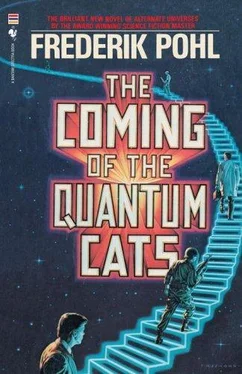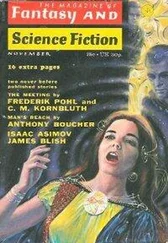Frederik Pohl - The Coming of the Quantum Cats
Здесь есть возможность читать онлайн «Frederik Pohl - The Coming of the Quantum Cats» весь текст электронной книги совершенно бесплатно (целиком полную версию без сокращений). В некоторых случаях можно слушать аудио, скачать через торрент в формате fb2 и присутствует краткое содержание. Год выпуска: 1986, ISBN: 1986, Издательство: Bantam Books, Жанр: Фантастика и фэнтези, на английском языке. Описание произведения, (предисловие) а так же отзывы посетителей доступны на портале библиотеки ЛибКат.
- Название:The Coming of the Quantum Cats
- Автор:
- Издательство:Bantam Books
- Жанр:
- Год:1986
- ISBN:9780553763393
- Рейтинг книги:5 / 5. Голосов: 1
-
Избранное:Добавить в избранное
- Отзывы:
-
Ваша оценка:
- 100
- 1
- 2
- 3
- 4
- 5
The Coming of the Quantum Cats: краткое содержание, описание и аннотация
Предлагаем к чтению аннотацию, описание, краткое содержание или предисловие (зависит от того, что написал сам автор книги «The Coming of the Quantum Cats»). Если вы не нашли необходимую информацию о книге — напишите в комментариях, мы постараемся отыскать её.
The Coming of the Quantum Cats — читать онлайн бесплатно полную книгу (весь текст) целиком
Ниже представлен текст книги, разбитый по страницам. Система сохранения места последней прочитанной страницы, позволяет с удобством читать онлайн бесплатно книгу «The Coming of the Quantum Cats», без необходимости каждый раз заново искать на чём Вы остановились. Поставьте закладку, и сможете в любой момент перейти на страницу, на которой закончили чтение.
Интервал:
Закладка:
"That's a new one on me, DeSota."
"It isn't a line, Nyla."
She thought for a moment, then looked around and grinned. "Under the circumstances," she said, "it might as well be. Let's talk about something else. What's this about a Gershwin concerto? He died young, you know." I shrugged; I really didn't know much about him. "He left a lot of good stuff," she went on, watching me get up and pace over to the window. "All the pop stuff, of course. And then the Rhapsody in Blue, the Concerto in F, the American in Paris . . . but honest, he never wrote anything for violin."
I was looking down at the portal, where the not-really-Djugashvili was playing with the same sort of console he had on the other side. I shook my head decisively. "Wrong, Nyla. Absolutely wrong. I'm not expert in classical music, that's for sure. But some rubbed off from hanging around with you—with the other Nyla. The Gershwin I've heard many times. It's full of melodies, which makes it easier for a guy like me. I think I could even whistle it—wait a minute." I walked around, trying to remember the lovely, rippling opening theme Nyla played so beautifully on the solo violin. When I managed to try it I knew I didn't do it justice-but it's the kind of definitively beautiful music, like some of the Mendelssohn and Tchaikovsky, that sounds good even when it's butchered.
She frowned. "I never heard that, But it's pretty nice."
And she pursed her lips to try it herself.
And I leaned forward to her puckered lips and kissed her.
She kissed me back.
I'm nearly sure she kissed me back. I could feel those nice, dry, soft, warm lips opening under mine, but I didn't wait to make sure. I gave her the edge of my fist on the back of the neck, as hard as I'd ever done in judo class.
She dropped like a rock.
That sort of hand-to-hand combat was all theory to me. I'd never done it before, except as ritualized exercise. I hadn't planned to do it then, although one part of my brain, all along, had been screaming to me that Nyla's fatigues and my fatigues were absolutely indistinguishable, bar the fact that she wore a green armband and carried a carbine, and I had neither.
When she fell I was not absolutely sure I hadn't hit her too hard.
But when I put my hand on that familiar breast under that very unfamiliar fatigue blouse I could feel that the heart and lungs were going strong.
"I'm sorry, sweet," I said. I pinned her armband onto my sleeve. I took her carbine off the floor and slung it over my shoulder. And I left without looking back.
At the age of seventy-three, Timothy McGarren had been doorman at Lakeshore Towers since the day it opened its doors and he turned in his retirement papers to the Metropolitan Transport Authority. They were the same day, and both were ten years in the past. He had made the trip from curbside to elevator so many times that he could do it in his sleep, or walking backward. Sometimes, like now, holding the doors for Mrs. Spiegelfrom 26—A, he actually did do it backward, feeling with his foot for the bottom step. Only there didn't seem to be one. He overbalanced, grabbed for the railing, missed, and dropped into thirty feet of water, with the lights of the Chicago skyline blinking at him over a hundred yards of Lake Michigan water.
24 August 1983
12:30 P.M. Major DeSOTA, Dominic P.
This base we had captured was stuffed fuller of goodies than a Christmas stocking. The goody I appreciated most was the base commandant's office. It had its own private base commandant's dining room, with kitchen attached; and in the base commandant's private freezer the cooks had discovered half a dozen of the thickest, juiciest, most marbled steaks I ever put a tooth to. It came out even. There were six of us to eat them: Lieutenant Colonel Tempe, heading the nuke research detachment; the MP major, Bill Selikowitz; the Signal Corps captain; two other captains who were Tempe's adjutants; and me. We were the most rank on the base—on our side, anyway—and rank had its privileges. We ate off a linen tablecloth with linen napkins and sterling silver, and if the glasses had only water in them, at least they were Danish crystal. Outside the big picture window on the fifth-floor dining room of the base headquarters we could see the sixty-odd buildings we had captured, with Selikowitz's MP's patrolling in their jeeps. It was hot out there, but in our little castle the air-conditioning was working just fine.
We were six happy guys.
One of Colonel Tempe's adjutants was chortling over the dumb projects they'd uncovered—a group of weirdos trying to read the enemy's minds; binary chemical weapons of the kind we'd tried, and discarded, five years before; laser guns that would fry an enemy soldier at a distance of three miles, provided he stood still for at least ten minutes without ambling out of the beam.
That was the comic relief. These people had wasted more money on dumb ideas than we had. But not all their ideas were dumb! By the time we got to the apple pie and ice cream, Colonel Tempe was telling us the serious stuff. The rest of us listened hard; in another forty-eight hours it would no doubt be classified down to a whisper, but we were getting it right from the source. At nuclear weapons these people had us outclassed six ways from Sunday. "Cruise missiles," he said. "Like little jet planes that come in under the radar, too fast to be intercepted, with built-in maps so they always know where they're going. Multiple warheads; you launch them in one piece and they separate, ten miles up, and six different missiles hit six different targets. And submarines."
That took me by surprise. "Submarines? What the hell is special about submarines?"
"These are nuclear-powered, DeSota," he said grimly. "Big bastards. Ten thousand tons and better. They can stay underwater for a month, where the enemy can't find them; and each one of them carries twenty nuclear missiles with ten-thousand-mile range.Jesus! Never mind your damn sneak-attack biologicals! If we could get just one of those damn submarines through a portal, the Russians'd have to lie down and die for us!"
Suddenly the pie didn't taste as good any more.
"But we walked right over them," Selikowitz objected.
The colonel nodded. "They weren't expecting us," he said. "Now they know where we are."
"Oh, come on, Colonel," I put in. "They're not going to nuke their own base?" It was meant as an argument, but halfway through it turned into a question.
Nobody wanted to answer it. Not even the colonel. He attacked his pie in silence for a moment, then burst out, "We're doing this all wrong, damn it! We should've gone right for the top! Hit the White House. Grab their President. Tell her what we were going to do, and then it's all over before the Russians and their damn satellites begin to get curious about this damn 'archaeological dig' out in the desert!"
They were all looking at me; I began to wish I hadn't opened my mouth. Who was Ito defend the decisions of the Chiefs of Staff? All of us knew how hard the debate had raged, and none of us, especially not me, had had any voice in which way the vote went.
Still—
"Colonel," I said, "let's look at facts. Fact one. It doesn't matter what kind of weapons these people have, they can't use them against our interior because they can't get at us. The only way they could do that would be with a portal, and the reason we came here first was to preempt the possibility they'd build one."
"They were nowhere near," complained one of the adjutants.
"They might have made it pretty fast," I said. "Once they knew it was possible, that answered a lot of questions. We couldn't take that chance. Now we've got this base, and there's no way they can retaliate against us—whatever we do."
Читать дальшеИнтервал:
Закладка:
Похожие книги на «The Coming of the Quantum Cats»
Представляем Вашему вниманию похожие книги на «The Coming of the Quantum Cats» списком для выбора. Мы отобрали схожую по названию и смыслу литературу в надежде предоставить читателям больше вариантов отыскать новые, интересные, ещё непрочитанные произведения.
Обсуждение, отзывы о книге «The Coming of the Quantum Cats» и просто собственные мнения читателей. Оставьте ваши комментарии, напишите, что Вы думаете о произведении, его смысле или главных героях. Укажите что конкретно понравилось, а что нет, и почему Вы так считаете.












